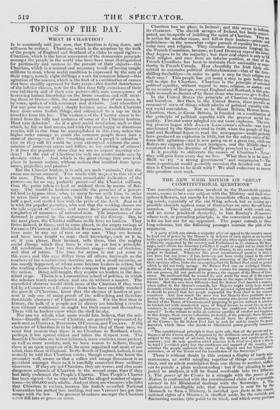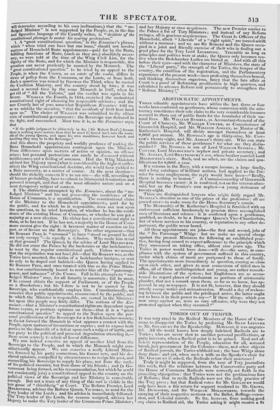THE NEW WHIG NOTION ON "GREAT CONSTITUTIONAL QUESTIONS."
THE constitutional question involved in the Household appoint- Inuits, seems to be a sore subject with the Ministry and them obse- quious followers, not merely for its immediate effects upon .reflect. ing minds, especially. of the old ‘Vhig school, but as raising up a possible obstacle agaanst some of themselves on some fhr-off future occasion. The point, accordingly, is laboured with much care, and no mean jesuitical dexterity, in last Sunday's Examiner; whose text, or pervading principle, is the convenient maxim—law is for time but not for my opponent. The paper extends to three long columns, but the following passages contain the pith of the argument.
" A party which can obtain a majority after an appeal to the country cannot be kept ma of power by the Monarch in defence of such rights as are involved in the appointment of the Household ;—[or of any other rights whatever ;]—and a Ministry supported by the country. and Parliament in its claims on the Sore- reign, must obtain the direction (whether it ought or ought not to obtain it) of the patronage, power, and influence of time Crown, to any extent it may think proper to demand. Whenever this great constitutional question is tried, it can have but one issue : it has, however, not been really raised in the recent case ; and in the'fallacy which pervades the reasoning of the Tory writers and their apostate allies, lurks the assumption that Sir RObert Peel stood on ground which he did not truly occupy. Sir Robert Peel was an unfledged Minister, destitute of the constitutional plumage to sustain his soaring pretensions; he did not possess, did not pretend to possess, the support of the Rouse of Com- mons. Ile confessed that he wanted it ; and made the want of it the express reason for his making such raekrent demands on the signs of the Queen's con- fidence. fInd tiie case been different—had Sir Robert reel boasted a majority when called to the Queen's councils, her Majesty might fairly Inca resisted demands which appeared to encroach on her personal rights and emnfinis, until it should be proved that her people supported the Tory chief in ids unusual exactions. And how much the more was her Majesty then justifiable in re- jecting the requisitions of a Minister, who coming into power without the con- fidence of the House of Commons, and proposing to govern without it, asked to be tricked out with counterfeit signs of Royal &your, to assist Iota ns an ad- venturer, in wilinink,r, under false pretences, the confidence which be had not earned ? In the refusal to make au extreme sacrifice of comfort smut baroness to this design, there was IM infraction, no denial, of the principle that a Minister having the support of the country, should have the plenary confidence of time Crown ; for Sir Robert Peel had to seek for and to acquire the grand essential, which those who accede to Ministerial power generally commence with. " The constitutional principle is then quite safe, that all the powers and in- fluences of the Crown must, if required by the deliberate sense of the public, be subject to time control of advisers having the support and confidence of the country ; mid the only question which remains to be tried is—[wlien is this to be tried ? ]—which party has the confidence and support of the Country, and whether the people maintain the cause of the Queen and her Liberal Mrni- nistration, or of the Tories and the humiliation of the Sovereign ?" There is without doubt in this extract a display of hardy mis- statements, an artful mingling together of things essentially dis- tinct, mid an adroit modulation front one theme to another, suffici- ent to puzzle a plain understanding : but if the pleading be sub- jected to analysis, it will be found resolvable into two fallacies. 1. The power qt' the Crown in a struggle with the power of the Nation, is confounded with the constitutional claim of a resperlale adviser in his Ministerial dealings with the Sovereien. 2. Thc distinct and intelligible rule, that whosoever is sent for by the Monarch to form a Ministry, is entitled ipso facto to the con5ti7 tutional rights of a Minister, is shuffled aside, for the variable and fluctuating maxim, (the point to be tried, and which every partisan will determine according to his own inclinations,) that the " un- fledged Minister " is not supported by the People, or in the fine and figurative language of the Courtly writer, is "destitute of the constitutional plumage to =stair his soaring pretensions." 1. A "great constitutional question," in the Examiner's phrase, which " when tried can have but one issue," should not involve Matters of Household State appointments—paid for by the State, fulfilling functions of State, (such as they are,) absolutely neces- sary, we were told at the time of the Whig Civil List, for the (Agility of the State, and for which the Minister is responsible, this question can never prudently be mooted by the Monarch. The " great constitutional question " to be tried by an appeal to the People, is when the Crown, as an estate If the realm, differs in views of policy from the Cmintions, or the Lords, or from both. such a question was raised by Gamma the Third, when he ousted the Coalition Ministry, and the country stood by him ; it was raised a second time by the same Monarch in .1807, when he got rid of " All the Talents," and the verdict was again in his • favour. WILLIAM the Fourth, in 1834, exercised the undoubted constitutional right of choosing his responsible advisers ; and the now Courtly but of yore somewhat Republican Examinee told us, or we mistake the occasion, " that the accidents (if birth bear hard upon us." The choice of WILLIAn was submitted to the nrnina ratio of constitutional governments : the Sovereign was defeated in the fight, and succumbed. Most true it is, as the Examiner says, that "If the public judgment be ultimately in his [ Sir Rolwrt Peel's] favour, there is nothing more certain than that Le must be forced bark into the coun- cils of the young Queen, and upon his own conditions, however harsh and iusulting they may be to the Sovereign."
And this shows the propriety and worldly prudence of makiimg the State Household appointments contingent upon the Minister. From differences upon matters of action or opinion, no offence arises; but personal pretensions can rarely be discussed without invidiousness and a feeling of soreness. Illid the Whig Ministers advised her Majesty upon (what is considered by the highest autho- rities) the Whig constitutional doctrine, she would have yielded to a State necessity, as a matter of course. At the next election— should the ricketty concern 1F-ti to see one— she will, according to all human probability, have to eubmit to Ministerial domination and personal triumph, and that of the most offensive nature and on a most derogatory subject of contest.
2. The distinction attempted by the _Examiner, about the " un- fledged Minister" and his not possessing the confidence of' the House of Commons, is a mystification. The constitutional claim of the Minister to the Household appointments, paid for by the public, and for which he is responsible, does not rest upon the questions, to be tried hereafter, of whether he has the confi- dence of the existing House of Commons, or whether he can get a majoritpat a new election. Ile either has a constitutional right to them, or he has not. If he has not, a majority in the House of Com- mons cannot give the right : it becomes matter of' exaction on his part, or of favour on the Sovereign's. The other argument—that Sir ROBERT Pam. is " assumed" to have " stood on ground he did not truly occupy "—is equally a delusion. Who made him stand on that ground? The Queen, by the advice of Lord MELBOURNE. He did not enter the Palace by the backstairs or the bedchamber; he went by the regular constitutional path. Unless we assume that the negotiation was not bmui fide—that Sir ROBERT was, as the Tories have asserted, the victim of a bedelnunber intrigue, or sent for only to be duped and bubbled—the Queen having applied to Sir ROBERT PEEL, and once treated with him as the Prime Minis- ter, was constitutionally bound to render him all the "patronage, power, and influence" of the Crown. Fail hi his attempts an "un- fledged Minister" may, for all futurity is uncertain ; flail he must, If he cannot obtain the support of Parliament, or of the People on a dissolution ; but his Ciltire is not to be caused by the Sovereign, who confidentially employs him. Constitutionally, we conceive that public appointments, remunerated by the public, and fo.• which the Minister is responsible, are vested in the Minister: but upon this people may ffiirly differ. The notions of the Ex- aminer,—that a blister's constitutional rights are dependent upon future events, or partisan opinions on them—that it is a "great constitutional question" to appeal to the Nation upon the per- sonal predilections of the Sovereign for a few Bedchamber-women; to thrust forward the Monarch in what appears a contest with the People, upon matters of ffivouritism or caprice ; and to expose both parties to the discredit of at defeat upon such a subject. of battle, and one party to the political and personal degradation attending it,— these seem scarcely to admit of honest difference. We can indeed conceive an appeal of' another kind from the Sovereign to the People, and in which the Monarch might con- stitutionally appear. We can conceive a really Liberal Minis- ter, fettered by his party connexions, his former acts, and his de- clared opinions, compelled by circumstances to resign his post, and counselling his Sovereign to supply his place, not from the ranks of his political enemies, but from those of his friends ; mid (a Go. vermnent being formed, on Isis recommendation, but which he could not consistently join) a constitutional appeal to the country on the political views of the Sovereign and her Ministry is conceivable enough. But not a trace of any thing of this sort is visible in the late game of " thimblerig " at Court. The Reform Premier, Lord MELBOURNE, advises the Reffirm Queen, Victottet, to send for the Tory leader of the Lords ; and his advice is immediately followed. The Tory leader of the Lords, for reasons assigned, advises her Majesty to make the Tory leader of the Commons Prime Minister ; and her Majesty at once acquiesces. The new Premier carries to time Palace a list of Tory Ministers ; and instead of any Reform twinges, all is gracious acquiescence. The Great he Officers of the Household, albeit " Liberals" of a "right spirit," are turned adrift without a murmur ; and we see Sir ROBERT and the Queen occu- pied in a joint and friendly exercise of their wits in finding out a good place for the Tory Lord LIVERPOOL. Tractable as long as principles and politics were at stake, the Queen only becomes res- tive when the Bedchamber Ladies are hinted at. And with all this before their eyes—and with the character of Ministers, the state of the "Liberal party," the strength of the Tories, the temper of the country, the condition of the registration, and the Parliamentary experience of the present week—men professing themselves honest, and thinking themselves sagacious, fancy that the late affair at Court is a proof of Reforming predilection in high quarters, and calculated to advance Reform and permanently to strengthen the " Reform Ministry !,"



























 Previous page
Previous page